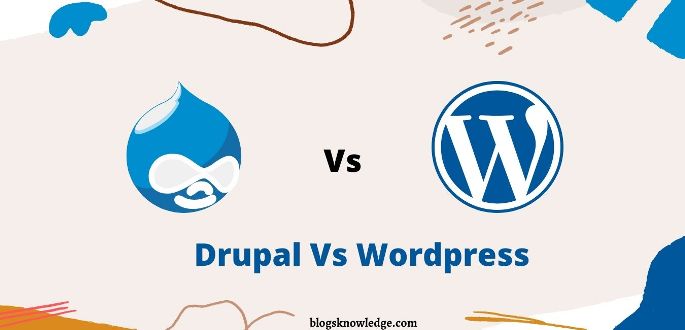The debate between Drupal vs. WordPress is often of little of comparison when it really comes down to most bloggers and web developers.
Most are going to choose WordPress simply because it’s such popular and so simple to use. There are still however many webmasters and even bloggers who have never heard of Drupal. But Drupal still holds its own place in the niche, even though very few.
Drupal Vs WordPress

Plugins
First of all, both Drupal and WordPress are great CMS (content management systems). They differ mainly in the degree of plugins that they offer. Drupal’s plugins can be seen as being more “advanced” than WordPress’s.
This however is merely a generalization and more concretely, anything that does not have a standard format within Drupal will require some sort of plug-in to be implemented.
Themes
Secondly, both platforms support a wide variety of themes. While many themes within WordPress will work just as well with Drupal, there will always be certain things that cannot be done and cannot be integrated into any Drupal theme.
So you would be creating a new website with WordPress and using its themes, but then would be creating a new website in Drupal by using one of its themes, but using a plug-in to implement any necessary functionality that was missing.
Functions
Thirdly, while Drupal offers a large community of developers who are willing to contribute to it, WordPress has the additional benefit of having a large number of third-party development solutions.
With the many different open source programming tools available, this allows Drupal to offer a far more robust set of features for the end-user than what could realistically be provided by WordPress.
Therefore, Drupal tends to be seen as being more upfront and closer to the “core” functionality that is needed in order to have a functioning website.
WordPress Disadvantages
However, in some ways, the two platforms do have their disadvantages. In the case of WordPress, the primary disadvantage is that it is generally not as customizable as Drupal is.
The only true customization that is generally possible is with the addition of plugins, and even then most plugins are extremely easy to install on both Drupal and WordPress.
WordPress also suffers from a lack of standardized formats. Even though WordPress offers much better templates and formats, Drupal’s formatting capabilities tend to be much less flexible, and Drupal’s versioning system is less efficient than WordPress’s.
Drupal Disadvantages
The biggest disadvantage of Drupal is that it does not have the same sort of extensibility that WordPress does. WordPress offers several different types of plug-ins to make the content management experience as seamless as possible.
Drupal’s core concept is based on a model of open-source software, which allows any change to be instantly implemented by the community at large, without requiring the modification of each individual module.
This means that while a new website may not need any and all of the modules available for WordPress, a Drupal theme will need to provide a certain amount of functionality in order for people to use the themes in a way that they want to.
Drupal Vs WordPress Customization
While both platforms offer a much larger community and an excellent number of plugins, the real difference comes down to customization. With WordPress, users are given the ability to literally alter every aspect of the website, while this is not generally the case with Drupal.
In addition, users of Drupal have the ability to utilize the same types of themes and templates as users of WordPress. As a result, a person who has a lot of experience with Drupal can much more easily design a site that is highly stylized and personalized.
On the other hand, a new user of Drupal will have to take more time learning how to customize his or her site because there is not as much available information about the different features of Drupal as there is with WordPress.
While Drupal may be slightly more complex and require more configuration than WordPress, it does offer a much greater level of flexibility and the option to manage themes and customize the appearance of a website much more easily than WordPress does.
WordPress is not perfect, however, and many people find that it can be hard to keep everything working correctly. In addition, it requires the user to understand how to use all of its plugins, and this can often make it too complicated for even the most experienced users to work with.
On the other hand, Drupal offers a solid base of tutorials, plugins, and code libraries that makes it much easier for a person to build a site the right way the first time. So which platform is better?
Read also… How to Promote Affiliate Links on Blog?



